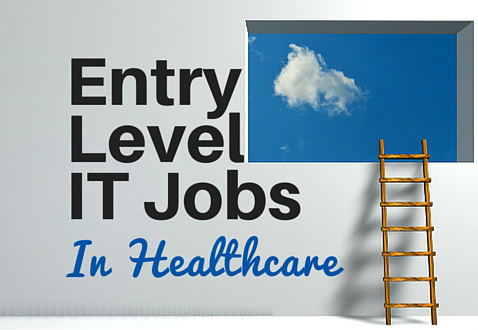If you’re looking to learn about entry level information technology jobs, this is the post for you. Yes, this is a Healthcare Technology site, and maybe you’re wondering if your technology career should be in the Healthcare arena. Before you click away, please stay with me for a few minutes to consider the idea that Healthcare IT really might be your best option. Before jumping into the kinds of entry level jobs in Healthcare, here are a few reasons why Healthcare IT is a great choice:
- Healthcare related jobs are relatively insulated from economic downturns
- You get to see tangible evidence that your efforts actually help people
- Healthcare IT workers have a strong teamwork culture and cohesiveness
- The Healthcare IT community is very diverse
- Healthcare organizations are becoming increasingly innovative
With that, let’s now have a look at some of the entry level Healthcare IT jobs you can consider:
Support Desk Technician
This of course is one of the first places people go to secure an entry level IT job. While there are some who claim a help desk job is an under-appreciated dead-end, I can tell you that in Healthcare, that’s not usually the case. I’ve known lots of folks who have used this position as a springboard to other opportunities as analysts, network engineers, trainers, and managers. End user support in Healthcare puts you in contact with clinical users in all kinds of settings. This will give you exposure to the business and operational side of Healthcare. A great place to start is a hospital IT department, but Healthcare software vendors will also usually have Support positions.
Preparing For A Technical Support Job
A great way to prepare for a Healthcare related Support Technician job is to start with basic PC and technology certifications through a group like CompTIA. I would start with A+ Certification and Healthcare IT Technician. After that, you can help yourself a bit more by taking a Medical Terminology class at a community college. You can then search for tech support positions either at local hospitals or Healthcare IT vendors in your area. There is a good chance you can get a technical support job on the second or third shifts just to start out.
Getting in the door is half the battle! Once you’ve secured that first job, you can then begin to build working relationships with clinicians, operational staff, systems administrators, and others.
Outsourced Help Desk Jobs
Some hospitals outsource a portion or all of their first level support services to an outside entity. These jobs are not as good as direct hire with hospitals or vendors, and many seasoned Healthcare IT folks look on these outside firms with disdain. They typically don’t have a good grasp of organizations’ products and processes. However, if you can’t find anything else and you’re ready to work your way up, this might work out. There are too many of these firms to list here. You’re better off searching local job listings for “support desk services”.
Business Applications Analyst
Within a Healthcare organization, there are lots of non-clinical applications and systems that need care and feeding. A Business Applications Analyst will support software products such as:
- Kronos (employee timecard readers and software)
- Sharepoint (Microsoft’s Intranet and document sharing solution)
- RightFax (electronic faxing)
- Various customer relationship management (CRM) solutions
- Telecom management systems – hardware and software
If you don’t have much clinical knowledge, it’s a clear path to go from the support desk to supporting Business Applications.
Hospital Inventory Software
Every hospital has some kind of materials management department, usually called Central Supply. This area needs software to support the management, tracking, billing, and reordering of supplies. This is a great place to start if you have any inventory or warehousing experience. You could build on this knowledge by getting the same certification called out in the Support Technician job as well as some Materials Management certification. Some of the leading hospital materials management software solutions are:
- Par Excellence
- MEDITECH
- Omnicell
- Pyxis
- McKesson
- Infor Lawson
There are quite a few more vendors in this space, as it is quite fragmented.
Hospital Dietary Software
In a hospital, even food service is driven by software. It is especially important as physicians regularly order special or restrictive diets for medical reasons. If you work in food service and learn your department’s software, you have a decent chance at an entry level position supporting that system. Some of the top hospital dietary software providers are Vision, DFM, and CBORD.
I hope this post has given you some ideas and inspiration to begin a technology career. Once you have secured one of these positions, there are few limits to how far you can go in Healthcare Information Technology. Let me know what you think, and if I can answer any questions. You can reach out to me from the contact form on this site, or Twitter @HealthITSkills.
Next Up:


